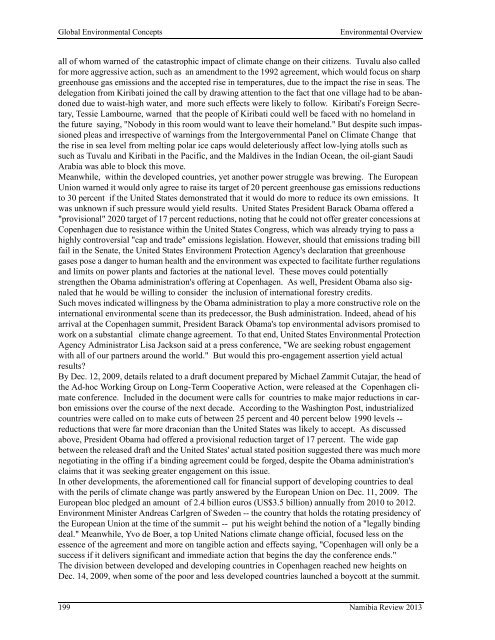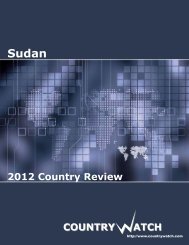Namibia - CountryWatch
Namibia - CountryWatch
Namibia - CountryWatch
Create successful ePaper yourself
Turn your PDF publications into a flip-book with our unique Google optimized e-Paper software.
Global Environmental Concepts Environmental Overview<br />
all of whom warned of the catastrophic impact of climate change on their citizens. Tuvalu also called<br />
for more aggressive action, such as an amendment to the 1992 agreement, which would focus on sharp<br />
greenhouse gas emissions and the accepted rise in temperatures, due to the impact the rise in seas. The<br />
delegation from Kiribati joined the call by drawing attention to the fact that one village had to be abandoned<br />
due to waist-high water, and more such effects were likely to follow. Kiribati's Foreign Secretary,<br />
Tessie Lambourne, warned that the people of Kiribati could well be faced with no homeland in<br />
the future saying, "Nobody in this room would want to leave their homeland." But despite such impassioned<br />
pleas and irrespective of warnings from the Intergovernmental Panel on Climate Change that<br />
the rise in sea level from melting polar ice caps would deleteriously affect low-lying atolls such as<br />
such as Tuvalu and Kiribati in the Pacific, and the Maldives in the Indian Ocean, the oil-giant Saudi<br />
Arabia was able to block this move.<br />
Meanwhile, within the developed countries, yet another power struggle was brewing. The European<br />
Union warned it would only agree to raise its target of 20 percent greenhouse gas emissions reductions<br />
to 30 percent if the United States demonstrated that it would do more to reduce its own emissions. It<br />
was unknown if such pressure would yield results. United States President Barack Obama offered a<br />
"provisional" 2020 target of 17 percent reductions, noting that he could not offer greater concessions at<br />
Copenhagen due to resistance within the United States Congress, which was already trying to pass a<br />
highly controversial "cap and trade" emissions legislation. However, should that emissions trading bill<br />
fail in the Senate, the United States Environment Protection Agency's declaration that greenhouse<br />
gases pose a danger to human health and the environment was expected to facilitate further regulations<br />
and limits on power plants and factories at the national level. These moves could potentially<br />
strengthen the Obama administration's offering at Copenhagen. As well, President Obama also signaled<br />
that he would be willing to consider the inclusion of international forestry credits.<br />
Such moves indicated willingness by the Obama administration to play a more constructive role on the<br />
international environmental scene than its predecessor, the Bush administration. Indeed, ahead of his<br />
arrival at the Copenhagen summit, President Barack Obama's top environmental advisors promised to<br />
work on a substantial climate change agreement. To that end, United States Environmental Protection<br />
Agency Administrator Lisa Jackson said at a press conference, "We are seeking robust engagement<br />
with all of our partners around the world." But would this pro-engagement assertion yield actual<br />
results?<br />
By Dec. 12, 2009, details related to a draft document prepared by Michael Zammit Cutajar, the head of<br />
the Ad-hoc Working Group on Long-Term Cooperative Action, were released at the Copenhagen climate<br />
conference. Included in the document were calls for countries to make major reductions in carbon<br />
emissions over the course of the next decade. According to the Washington Post, industrialized<br />
countries were called on to make cuts of between 25 percent and 40 percent below 1990 levels --<br />
reductions that were far more draconian than the United States was likely to accept. As discussed<br />
above, President Obama had offered a provisional reduction target of 17 percent. The wide gap<br />
between the released draft and the United States' actual stated position suggested there was much more<br />
negotiating in the offing if a binding agreement could be forged, despite the Obama administration's<br />
claims that it was seeking greater engagement on this issue.<br />
In other developments, the aforementioned call for financial support of developing countries to deal<br />
with the perils of climate change was partly answered by the European Union on Dec. 11, 2009. The<br />
European bloc pledged an amount of 2.4 billion euros (US$3.5 billion) annually from 2010 to 2012.<br />
Environment Minister Andreas Carlgren of Sweden -- the country that holds the rotating presidency of<br />
the European Union at the time of the summit -- put his weight behind the notion of a "legally binding<br />
deal." Meanwhile, Yvo de Boer, a top United Nations climate change official, focused less on the<br />
essence of the agreement and more on tangible action and effects saying, "Copenhagen will only be a<br />
success if it delivers significant and immediate action that begins the day the conference ends."<br />
The division between developed and developing countries in Copenhagen reached new heights on<br />
Dec. 14, 2009, when some of the poor and less developed countries launched a boycott at the summit.<br />
199 <strong>Namibia</strong> Review 2013




